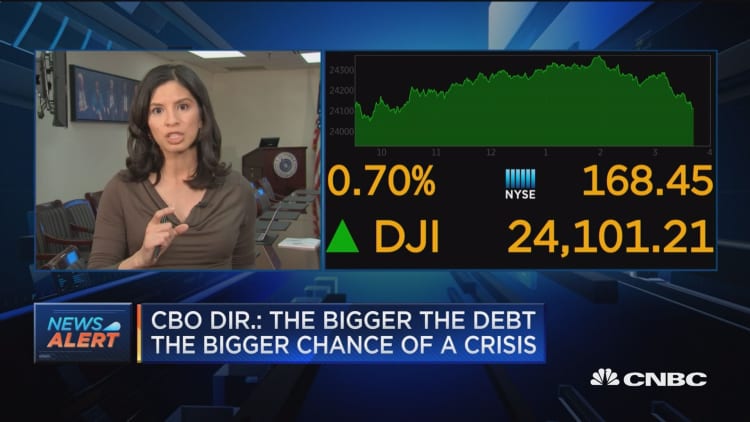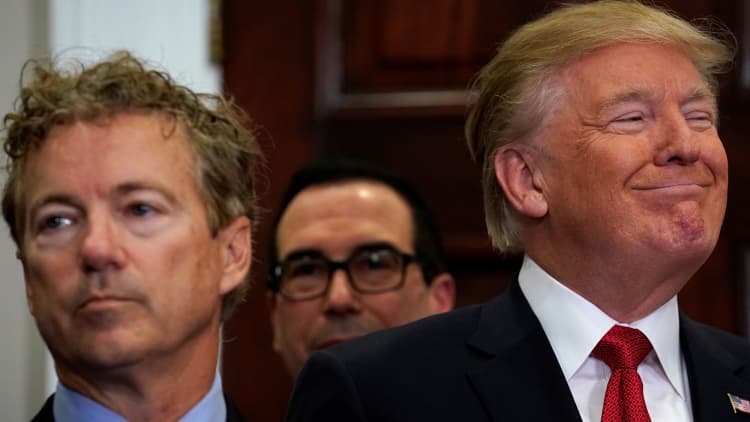
The Republican overhaul of America's tax code and increased government spending are projected to boost economic growth to 3.3 percent this year but push the national debt to nearly the same size as gross domestic product by 2028, according to government data released Monday.
The Congressional Budget Office forecast that the new tax law will generate an average of 0.7 percent growth over the decade and create 1.1 million jobs. It also predicted the two-year federal spending deal would increase GDP by 0.3 percent this year and 0.6 percent in 2019. However, larger budget deficits would crowd out private investment in later years, dampening economic growth.
As a result, the CBO estimated the cumulative deficit over the next decade will be $1.6 trillion larger than previously projected. By 2028, the national debt would total 96 percent of GDP.
"Such high and rising debt would have serious negative consequences for the budget and for the nation," the CBO report said.
Republicans have been fending off criticism from fiscal hawks for passing a $1.5 trillion tax cut late last year and following it up with a $1.3 trillion government spending deal with Democrats signed last month. The CBO estimates that annual deficits will reach $1 trillion in 2020, buttressing similar warnings from private forecasters.
"We now are facing trillion-dollar deficits as far as the eye can see — a terrible path, made even worse by the fact that this comes amidst a strong economy and is the self-inflicted result of irresponsible policy choices," said Maya MacGuineas, president of the Committee for a Responsible Federal Budget. "Hopefully it will serve as a wake-up call for our political leaders who have become frighteningly comfortable with deficit denial."
Democrats seized on the CBO analysis to attack one of the main GOP arguments for the tax cut bill.
"The CBO's latest report exposes the scam behind the rosy rhetoric from Republicans that their tax bill would pay for itself," New York's Chuck Schumer, the leading Democrat in the Senate, said in a statement.

Amid unrest among the conservative flank, Republicans are now trying to make amends. On Thursday, the House is slated to vote on a balanced budget amendment to the Constitution. The proposal would prohibit federal spending from outpacing revenues unless three-fifths of the House approves an exemption. A supermajority would also be required to raise taxes or the national debt limit, so it is unlikely to become a reality.
In addition to the amendment, Republican leadership has also spoken with the Trump administration about the possibility of rolling back parts of the federal spending deal. President Donald Trump spoke with Majority Leader Kevin McCarthy last week about sending Congress a so-called rescission request to cut funding, although by how much remains unclear.
A GOP source who declined to be named said lawmakers are supportive of the effort and are taking the little-used presidential power "seriously." Still, it is unclear whether Republicans would have 60 votes in the Senate to pass a spending reduction, but it would signal a remarkable about-face for members of both parties who backed the deal.
In its report Monday, the CBO also estimated the impact of making permanent the temporary provisions in the new tax law, which Trump and some GOP leaders have discussed, and maintaining the higher level of spending under the recently passed budget deal. The moves would push the national debt to 105 percent of GDP in 2028, the second-highest level in the nation's history.
The last time the U.S. debt hit 105 percent of GDP was right after World War II.
"Such high and rising debt would have serious consequences for the budget and the nation," CBO Director Keith Hall said. "The likelihood of a fiscal crisis for the United States will increase."
Hall added: "The timing of this is really concerning because we're not coming out of a recession. We're quite a few years out of a recession, and we have very high deficits."
Meanwhile, five former White House economists warned Monday against addressing the deficit by cutting entitlement programs such as Social Security. Writing in The Washington Post, Martin Neil Baily, Jason Furman, Alan Krueger, Laura D'Andrea Tyson and Janet Yellen argued that the funding gap has largely been driven by lower revenues and unfunded wars.
"The primary reason the deficit in coming years will now be higher than had been expected is the reduction in tax revenue from last year's tax cuts, not an increase in spending," they wrote.
WATCH: CBO estimates budget deal would cost $320 billion


